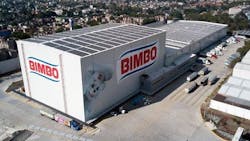Bakery Giant Grupo Bimbo Transforming Toward 100% Renewable Energy Portfolio
A global baked goods producer which has adopted microgrids at several of its U.S. manufacturing locations is getting close to achieving a net zero recipe for worldwide success in its energy use.
Mexico-based Grupo Bimbo’s new in-house report on its operational sustainability reported that the company gets 97% of its electricity load from renewable resources such as solar energy. Bimbo (pronounced Beem-bo) is connected or balanced 100% of its electricity demand with renewables in 28 of its 35 operating countries.
This sustainability ranges from facilities to fleet decarbonization. Grupo Bimbo has more than 7,750 vehicles using alternative fuels, over 4,200 of which are electric, thus moving towards becoming a net zero carbon emissions company by 2050.
The company’s environmental and energy talking points arrived through its “2024 Annual Report: Actions that Transform.” In addition to energy efficiency and renewable electricity, Grupo Bimbo also reports that 94% of its packaging is recyclable and plans to reach 100% this year.
“2024 was a year of great progress and significant efforts to continue generating a positive impact on the planet, in the lives of our associates and in the communities we touch,” Alejandra Vázquez, VP Global Sustainability at Grupo Bimbo, said in a statement. “We are very proud of these achievements within our Sustainability Strategy, as we continue to take firm steps toward our purpose of Nourishing a Better World.”
Last year, U.S.-based subsidiary Bimbo Bakeries completed six on-site microgrid energy systems at facilities in California. All of those microgrids were solar and battery storage combinations designed and built by developer GreenStruxure as part of energy-as-a-service contracts.
The American microgrids were designed to provide close to one-fifth of Bimbo Bakeries’ energy usage at those California plants, as well as avoid an estimated 1,700 metric tons of carbon emissions annually.
The six California bakeries include Montebello, Placentia, Oxnard, San Luis Obispo, South San Francisco, and Sacramento. The locations were chosen based on their energy intensity, increasing utility electricity costs, and highest decarbonization impact.
Grupo Bimbo has more than 100 food brands globally. Some of its production is developed within a regenerative agriculture array has now includes nearly 300,000 hectares. The company plans to shift all of its key ingredients to this pillar by 2050.
Grupo Bimbo reported nearly $22 billion in annual revenue for 2024. It is considered among the top global food producing companies.
About the Author
EnergyTech Staff
Rod Walton is senior editor for EnergyTech.com. He has spent 17 years covering the energy industry as a newspaper and trade journalist.
Walton formerly was energy writer and business editor at the Tulsa World. Later, he spent six years covering the electricity power sector for Pennwell and Clarion Events. He joined Endeavor and EnergyTech in November 2021.
He can be reached at [email protected].
EnergyTech is focused on the mission critical and large-scale energy users and their sustainability and resiliency goals. These include the commercial and industrial sectors, as well as the military, universities, data centers and microgrids.
Many large-scale energy users such as Fortune 500 companies, and mission-critical users such as military bases, universities, healthcare facilities, public safety and data centers, shifting their energy priorities to reach net-zero carbon goals within the coming decades. These include plans for renewable energy power purchase agreements, but also on-site resiliency projects such as microgrids, combined heat and power, rooftop solar, energy storage, digitalization and building efficiency upgrades.
